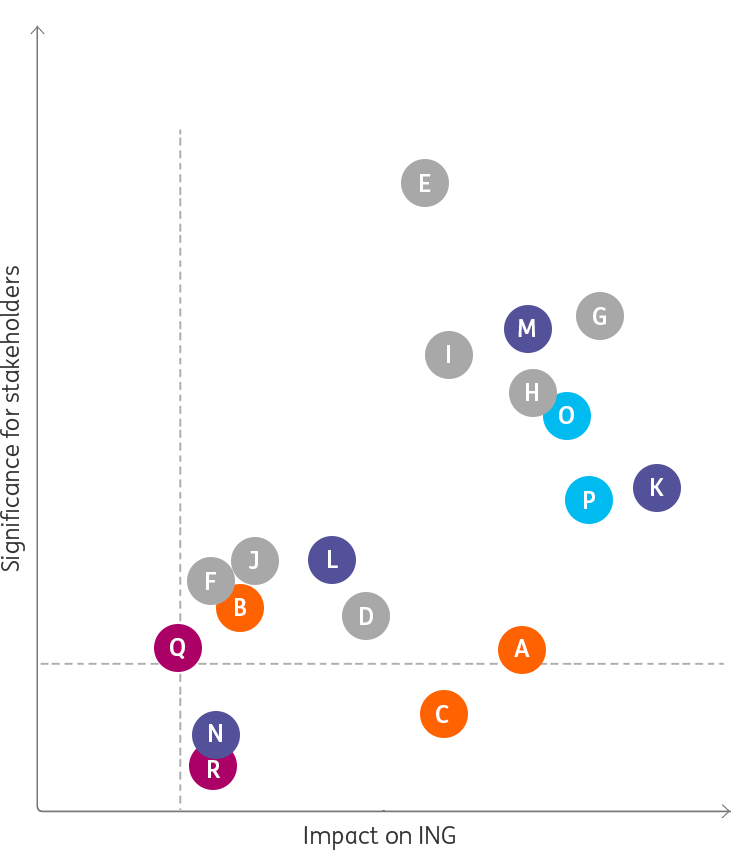Annual Review 2015

What matters most
We continually listen to and engage with our stakeholder groups to understand the issues that are most important to them. We do this in various ways, such as through customer surveys and panels, roundtables, and one-on-one discussions.
Finding out
ING conducts regular materiality assessments that guide us in our strategic decision making, stakeholder engagement agenda and reporting framework.
These assessments help us identify and understand the most important issues for our stakeholders and how these relate to the actions and decisions that we take.
For our 2015 materiality assessment, we polled our senior management and people from six stakeholder groups (business and retail customers, investors, non-government organisations (NGOs), regulators and employees) in five countries. All were asked to rank a range of topics by significance.
The topics were based on an extensive analysis of issues that either ING itself can have an impact on through our business and strategy, or that can impact ING’s own business. These topics were checked against ING’s own risk assessment as well as guidelines from international bodies such as GRI G4 and the Sustainability Accounting Standards Board (SASB).
In total, over 1,500 respondents from the Netherlands, Poland, Germany, Spain and Turkey provided us with insights into the issues that matter most to them, resulting in the materiality matrix below.
What the materiality matrix tells us

Economic contribution
- A Financial performance
- B Pricing of products and services
- C Managing risks
Customer centricity
- D Innovative business developments
- E Customer privacy and data security
- F Enhancing customer financial capabilities
- G Stability of IT systems and platforms
- H Usability and accessibility of our products and services
- I Fair communication about our products and services
- J Responsible lending and debt prevention
Fair operating practices
- K Regulatory developments
- L Anti-competitive behaviour prevention
- M Corruption prevention
- N Sustainable finance and investment policies
Stakeholder engagement
- O Transparency and openness
- P Regaining trust
Labour practices
- Q Diversity and equal opportunities, preventing discrimination
- R Remuneration of ING employees
The matrix plots the 15 issues that were the highest priority for stakeholders and that also had the biggest potential impact on our business. We describe the most important ones below.
Three topics that fell just outside the top 15 were also included because they were most important to certain other stakeholders: (C) Managing Risk, deemed important by ING’s Management Board Banking, (N) Sustainable finance and investment policies, deemed important by NGOs and (R) Remuneration, deemed important by society and government.
Balancing financial and non-financial expectations
From the materiality analysis, it is clear that stakeholders want us to address both financial and non-financial issues.
We have seen a shift in results since 2014, with stakeholders rating financial performance as less important in 2015. This reflects the more positive sentiment now that economic growth has returned.
This year topics such as IT systems and privacy were extremely important, and themes such as the prevention of corruption and anti-competitive behaviour have clearly grown in importance.
Customer centricity, transparency and openness are key
The materiality survey results show that customer centricity is the most important topic for stakeholders. This includes topics such as customer privacy, responsible lending, fair pricing and communications, and usability and accessibility of our products and services.
Regulatory developments
Regulatory developments are important to stakeholders, as seen in the materiality survey results. We actively follow all developments in financial supervision and regulation in all countries where we do business. Our goal is to comply with all financial regulation and be fully cooperative regarding financial supervision in a way that balances the interests of our stakeholders.
Environmental footprint less material to stakeholders
Stakeholders attached less importance to ING’s direct environmental impact in this year’s materiality assessment. This reflects an understanding that ING’s impact is much greater in our financing choices, and that efforts to limit ING’s environmental footprint are becoming more broadly recognised.
Balancing our responsibilities
We have many different stakeholders, all of whom have varying interests and expectations of us. We always strive to weigh the pros and cons to make decisions that are best for all involved.
Read more about balancing our responsibilities

